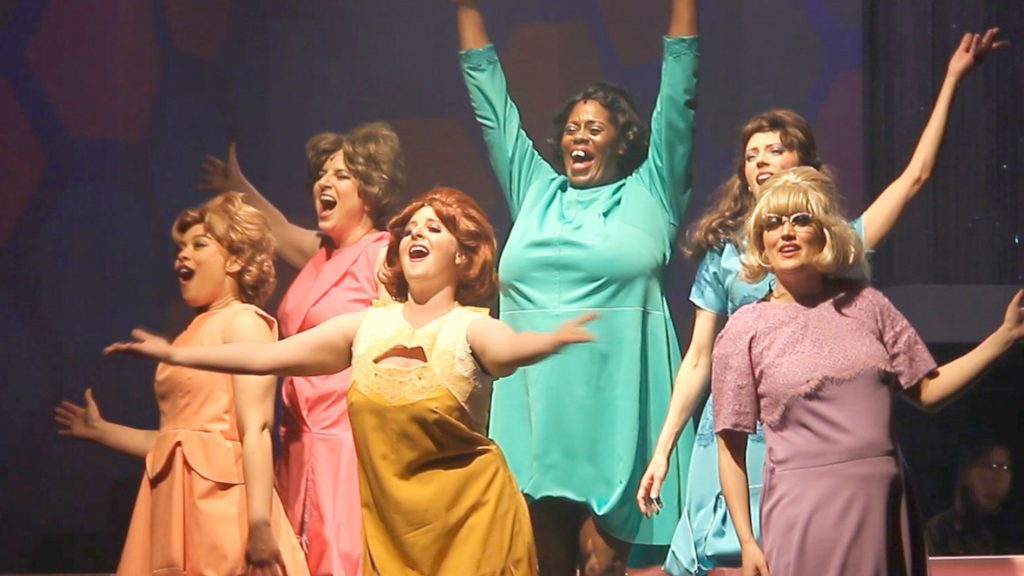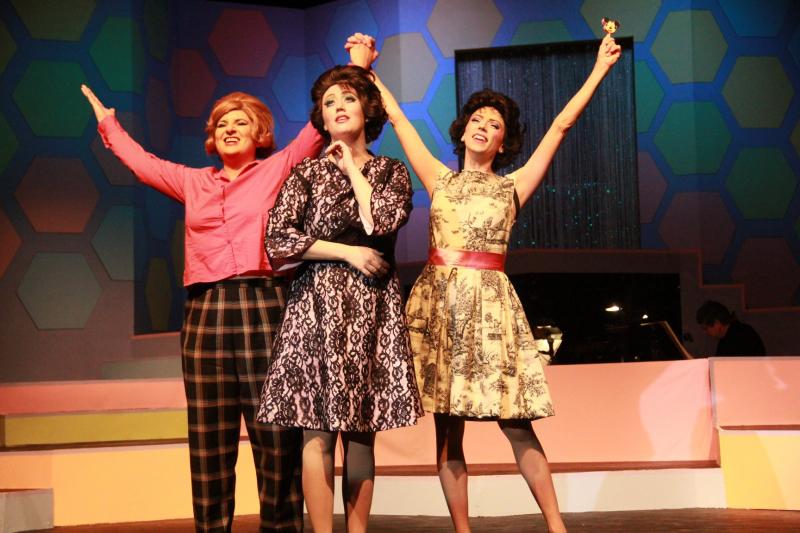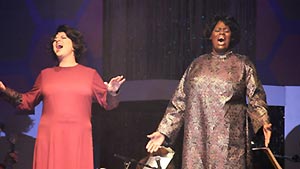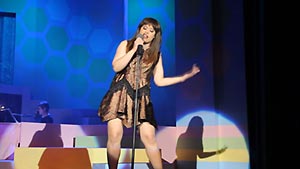Review: The Pollard Theatre Buzzes With Your Favorite 1960s Tunes in BEEHIVE: THE 60S MUSICAL!

The Pollard's 2018-2019 season has traveled through some of our favorite decades. Ghost haunted us with iconic trends and snapshots of the 90s, followed by the glam and class of the 1940s with It's a Wonderful Life. In June, they will splash into the 1970s with Disaster!. However, this spring the Pollard Theatre is bursting with tunes you will want to blast in the car full-volume, windows down, the perfect soundtrack for the first warm day after a long winter, and plastered in pastels only suitable for easter eggs or the iconic geometric patterned apparel of the 1960s. Beehive: The 60s Musical, created by Larry Gallagher, takes audiences on a musical journey from hip to groovy to raw, from innocence to loss of innocence, and how the evolution of the music of the decade impacted and propelled the female empowerment movement.
Though Beehive is not a commonly produced show, I have somehow managed to see it three times. The first two times I saw it, both about twelve years ago, life was a lot simpler. As a society, we weren't actively talking (in public) about things like the #MeToo movement or equality. Approaching this show for the third time in 2019, I found my thoughts swarming with different questions than I had in 2007. As the lights buzzed on, I was immediately aware of the archaic, dim, yet somehow still vibrant palette, only appropriate to the 1960s, arranged cleverly into neatly placed hexagons that colored the multi-level, American Bandstand inspired set, designed by James A. Hughes, with the ALMOST all female band tucked away in a cove centered on the ground level. The stage was quickly filled with 6 familiar faces, all veterans of the Oklahoma City theatre scene. If you have seen a production at the Pollard, or any other theatre in Oklahoma, you may have been lucky enough to enjoy the talents of the ladies of this star-studded, all-female cast featuring the brassy and bold Stef Fortney, the blissful beltress Megan Montgomery, the sassy and strong Mariah Warren, the show-stopping songtress De'Vin Lewis, the gritty and glamorous Jennifer Teel, and narration by sweet Susan Riley.
Riley serves as Queen Bee, juggling guiding us through the tale with keeping a sometimes low-energy audience engaged in sing-alongs and a few interactive moments like "The Name Game" and "The Beehive Dance." In one of her opening lines, Riley exclaims that "1960 is just like 1959," which perfectly sums up the first quarter of the show. The main difference was perhaps the Beehive styled hair-dos, coiffed by Hannah Finnegan, which each actress carefully balanced on her head with what I imagine was loads of bobby pins and prayer, as they ponied through the ultra campy first few tunes mostly exclaiming how wonderful life is and how much they want love and approval from boys in a true late 1950s fashion.

If you have seen anything directed by Timothy Stewart, you know that camp is one of his specialties. This set the perfect tone for the "pre-woke" teeny-boppers of the first half of the first act. But spoiler alert: the camp doesn't last forever. Some stand out moments that pushed me through the "boy crazy" segment of Act 1, were some of the impressions of these iconic artists, especially Mariah Warren's wide-eyed "One Fine Day" by The Chiffons and the eccentric, arm-flapping moves of Patti LaBelle portrayed by De'Vin Lewis. Montgomery's voice soared and broke our hearts in "Where the Boys Are." Fortney had the most relatable songs in the "Teens" segment whining out "It's My Party" and perhaps one of my favorite moments of the show, when she brandishes a switchblade out of her pajama pants pocket, threatening the men in the audience with her anthemic rendition of "You Don't Own Me." As Act 1 progressed, the hair got higher and the costumes, by Michael James, varied, giving us several different iconic looks of the era. Each girl had their staple outfit which hinted at the era well enough, but could have been a bit more flattering, as well as a handful of costumes changes as they cycled through playing the different music icons, each outfit more effective than the last.
 As we hit 1963, the musical, as the world did, quickly came to a halt. We see a shift to a more subtle and somber side of Stewart's direction and Michael Long's Lighting Design, as the lights dim from dancing, rainbow pastels, to 3 solitary specials, painting the stage in monotone. Riley, Warren, and Lewis deliver a tear-inducing, rare, raw moment, that in the midst of the energetic "mashed potatoes" and "twists", was quite refreshing. The camp is set aside as we see women of color step forward to deal with what reality will look like post JFK, post Martin Luther Jr., post-war, asking us, "Didn't you love the things they stood for? Didn't they try to find some good for you and me?" This moment comes to an abrupt end, as we jump into the finale section of Act 1, "British Invasion." Once again back we are back to talking about how wonderful men are for paving a path for women, lazily justified by dialogue stating that The Beatles served as a healing force during this time of loss of innocence for America's youth. Sure, you can't have a show about the 60s without talking about the Beatles and how they influenced the music, but it seemed misplaced tonally after one of the only real moments of the show. If I remember correctly, Act 1 used to end with "The Beat Goes On" by Sonny and Cher, which seemed way more appropriate. At any rate, we were sent dancing into intermission humming "Downtown," "Son of a Preacher Man," and "To Sir With Love," featuring Teel as a convincing Lulu in James' most effective costume, an a-line dress with blocks of vibrant primary colors over bright yellow tights and turtleneck.
As we hit 1963, the musical, as the world did, quickly came to a halt. We see a shift to a more subtle and somber side of Stewart's direction and Michael Long's Lighting Design, as the lights dim from dancing, rainbow pastels, to 3 solitary specials, painting the stage in monotone. Riley, Warren, and Lewis deliver a tear-inducing, rare, raw moment, that in the midst of the energetic "mashed potatoes" and "twists", was quite refreshing. The camp is set aside as we see women of color step forward to deal with what reality will look like post JFK, post Martin Luther Jr., post-war, asking us, "Didn't you love the things they stood for? Didn't they try to find some good for you and me?" This moment comes to an abrupt end, as we jump into the finale section of Act 1, "British Invasion." Once again back we are back to talking about how wonderful men are for paving a path for women, lazily justified by dialogue stating that The Beatles served as a healing force during this time of loss of innocence for America's youth. Sure, you can't have a show about the 60s without talking about the Beatles and how they influenced the music, but it seemed misplaced tonally after one of the only real moments of the show. If I remember correctly, Act 1 used to end with "The Beat Goes On" by Sonny and Cher, which seemed way more appropriate. At any rate, we were sent dancing into intermission humming "Downtown," "Son of a Preacher Man," and "To Sir With Love," featuring Teel as a convincing Lulu in James' most effective costume, an a-line dress with blocks of vibrant primary colors over bright yellow tights and turtleneck.
 Act 2 begins and the skirts are shorter, the make-up is more natural, the hair is longer. The need for whitebread, cookie cutter, perfection leftover from the 1950s has deflated just as quickly as the beehive hairstyle. We see women on the margins of society, pushing our country towards progression. It begins with Warren's energetic Tina Turner, where she emulates not only Turner's staple dance moves, but also her physical mannerisms, down to the detail of raising the right side of her upper lip as she belts out a scruffy and soulful "River Deep" and "Proud Mary" in thin stilettos and the classic Tina Turner jumpsuit, showing the most leg the 60s had probably ever seen. A standout moment of Act 2 was the Aretha Franklin medley featuring the always-flawless vocals of De'Vin Lewis, backed up by Stef Fortney in an empowering mash-up of "Natural Woman" and "Do Right Woman, Do Right Man." Lewis' voice soars effortlessly all the way from the stratosphere to the deepest depths as she writes a new mantra for women with the lyric, "a woman is not a plaything...she is flesh and blood just like her man."
Act 2 begins and the skirts are shorter, the make-up is more natural, the hair is longer. The need for whitebread, cookie cutter, perfection leftover from the 1950s has deflated just as quickly as the beehive hairstyle. We see women on the margins of society, pushing our country towards progression. It begins with Warren's energetic Tina Turner, where she emulates not only Turner's staple dance moves, but also her physical mannerisms, down to the detail of raising the right side of her upper lip as she belts out a scruffy and soulful "River Deep" and "Proud Mary" in thin stilettos and the classic Tina Turner jumpsuit, showing the most leg the 60s had probably ever seen. A standout moment of Act 2 was the Aretha Franklin medley featuring the always-flawless vocals of De'Vin Lewis, backed up by Stef Fortney in an empowering mash-up of "Natural Woman" and "Do Right Woman, Do Right Man." Lewis' voice soars effortlessly all the way from the stratosphere to the deepest depths as she writes a new mantra for women with the lyric, "a woman is not a plaything...she is flesh and blood just like her man."
The only thing that could possibly follow such a stellar segment, is Teel's uncanny and gritty portrayal of Janis Joplin's 1969 Woodstock performance. Teel embodies Joplin from head to toe, from gesture to vocal. The sound of someone shredding their vocal chords never felt so good. But how else can one capture so perfectly the tortured blues inside of this rock legend, setting the stage for many more women to come in Rock 'N Roll? Teel, clad in feathers, a knit vest, and red slacks, tears us to pieces (in the best way) in "Cry Baby," "Try," and crowd-favorite "Me and Bobby McGee." Montgomery was also briefly a part of the Woodstock section and I wish I could tell you more about it. Unfortunately her body mic and a back up handheld mic were both not working consistently. This is a problem not unfamiliar to audiences at Pollard shows. Being that Beehive is more about celebrating the music than focusing on plot or dramatic structure, it would have been nice for more energy and volume from the band and guaranteed working microphones, but #livetheatre. That's no fault to the performers, who, in spite of some technical difficulties, carried on professionally. They closed out the show with an uplifting call to action to the audience to, "Make Your Own Kind of Music," a very pretty bow on top of a fun, albeit slightly surface-level, show.
I believe there is always an opportunity and, for artists, a responsibility, now in 2019, even in a musical revue, to use the journey of these women who came before us, as a teaching tool for young women today. Though the struggles these women faced created an easier world for us to live in, women are still facing injustices similar to those that their sisters faced 50 years ago. Stewart managed to craft a few of those important, meaningful moments, finding ways for the characters to find strength and empowerment through the music, without much assistance from the playwright. Perhaps nostalgia helped strike a deeper chord for those audience members who experienced these scenes first hand.
All of that aside, Beehive is a lot of fun for all ages! Beehive runs until May 4, so grab your best 1960s costume (not-required), drive to Guthrie, and don't miss out on a night of good music and Great Performances! The successes and joys of Beehive are a credit to the creative team and the cast. Some of the individual performances are worth the ticket price alone. I can guarantee that you will leave singing some of your favorite 60s tunes for hours, maybe even days afterwards!
For more information or to purchase tickets, CLICK HERE!
Photos courtesy of Jared Blount
Reader Reviews

Videos

